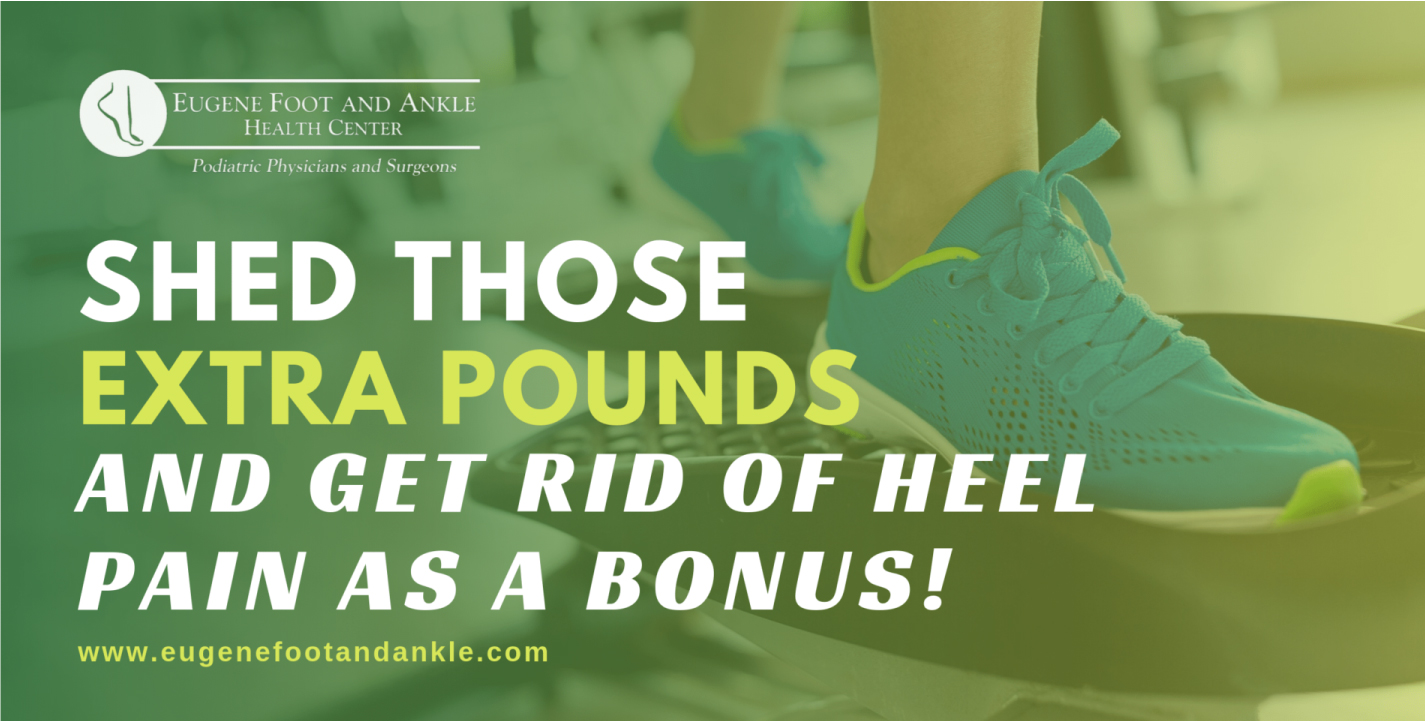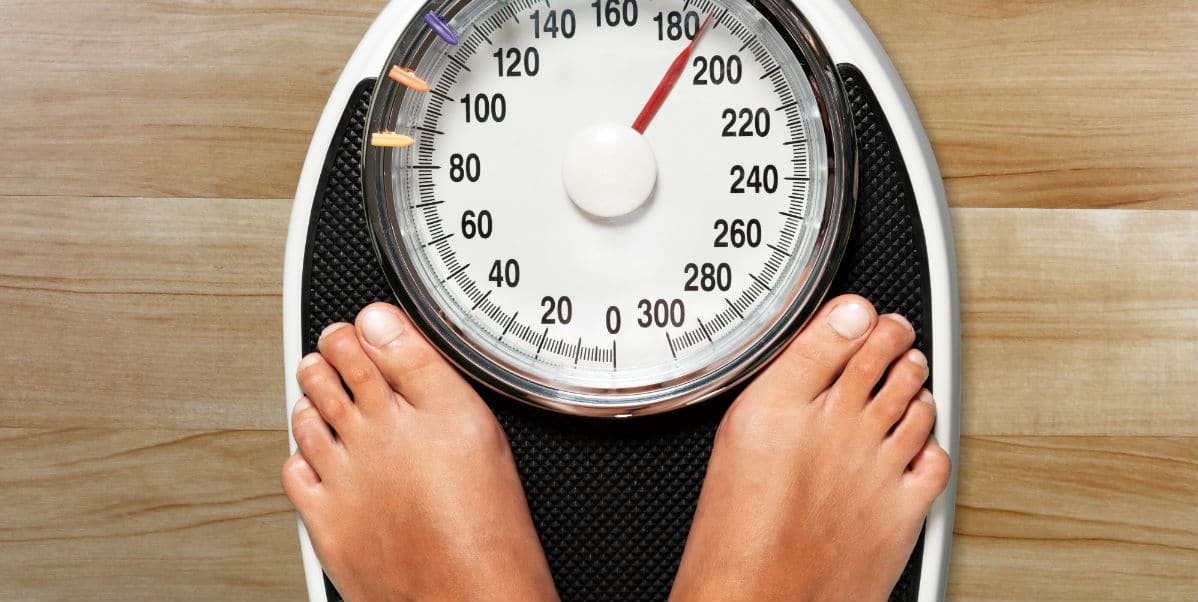Shed Those Extra Pounds (And Get Rid of Painful Feet as a Bonus!)
Did you know that 68 percent of Americans today are considered obese? And while most of us are aware that being overweight increases the risks of cardiovascular disease, arthritis, diabetes, cancer, and many other health problems, some of you may not know that those extra pounds can also increase your risk of heel pain and painful feet.

Surprised? Because you shouldn’t be.
Your feet bear the weight of your entire body as they take you from here to there while you go about your daily routine. Whether you are simply taking out the trash or running to catch the bus, your feet will absorb up to four times your body weight with each step you take.
That’s a lot! (Especially if your body mass is well above the recommended average.)
Heel Pain, Painful Feet, and Obesity
Recent research has found that obesity and heel pain are closely related. Having too much body weight increases your risk of developing many sports injuries and other foot conditions that cause heel pain, including:
- Achilles tendinitis
- Plantar fasciitis
- Osteoarthritis
and more.
The extra weight dramatically increases the impact of daily activities on your feet, and can lead to flattening, trauma, and micro-injuries not only in the heels but also other parts of the foot – and all this means pain.
You don’t have to be obese before your weight starts affecting your feet, either! Even 15 or 20 extra pounds can be enough to make your heels suffer.
Of course, for those who are obese, the impact of weight absorbed by the feet will often result in changes in posture, causing the knees to come closer together while walking which, in turn, shifts the body weight to the insides of the feet. This shift can be detrimental to the arches and tendons in the feet and ankle, and even lead to hip and back problems.
No worries, though! Heel pain will diminish (and eventually disappear altogether) once you start proper treatment. What this looks like will depend on the root cause of your painful feet, but typically treatment will include providing proper support and protection to the feet (for some patients through the use of custom orthotics) and educating patients on weight loss options, like staying active.
But there’s a catch: Heel pain will often make it difficult to lose weight with exercise. After all, how are you supposed to stay active when painful feet and heels are literally holding you back?

Lose Weight (Despite Heel Pain)
Having to lose weight can be challenging enough without throwing heel pain into the mix. But even for those suffering from this inconvenient foot problem, weight loss is still an achievable reality – and can even be enjoyable – if you just take some time to prepare your feet for the job and know what to do when heel pain starts threatening to kill your motivation.
Here are some tips to keep in mind:
- Find the perfect shoes.Wearing a good pair of shoes that support your arches and protect your heels is one of the most important aspects of treating heel pain, regardless of your weight. Make sure you choose footwear that has plenty of room for your feet, too – not too tight, not too loose.
- Gradually increase activity levels.Losing weight is all about incorporating lifestyle changes, not making desperate moves. Set a goal to walk for a few minutes each day, and gradually increase the length of your exercise sessions. Doing so will help set yourself up for success and avoid making your heel pain worse.
- Try some low-impact exercises. Low-impact exercises can keep you active and help with weight loss while reducing stress to your feet. There are many options for these types of activities, including swimming, water aerobics, yoga, spin cycling, and rowing machines. These are excellent calorie burners that place less pressure on your feet.
- Exercise your feet and heels.Keep the muscles and tendons in your feet limber and toned by routinely exercising your feet and heels. We can teach you some simple and effective stretching exercises to keep your feet in shape!
- Be mindful of what you put into your body.As a rule of thumb, use the “double down” rule: Double the amount of water you drink, the amount of fresh fruits and vegetables you consume, and the amount of lean protein you eat. At the same time, avoid refined foods like white flour and sugar, and be extra careful about the calories you drink (this means soda and, yes, juice).
Now, when it comes to heel pain and weight loss, your attitude and level of commitment will be vital for optimal results. So don’t get discouraged and follow through with your plans (but do take steps to manage your discomfort and alleviate symptoms so you can stay active without painful feet).
And if you ever need help, Dr. Michael “Dusty” McCourt and his team at Eugene Foot and Ankle Health Center are here for you!
Contact Our Office
If you have any questions, or are ready to shed those extra pounds and get rid of heel pain while you’re at it, give our office a call at (541) 683-3351 today. You can also take advantage of our online request form to have one of our staff members reach out to you instead.
Contact Us
Eugene
Hours:
Monday............ 8:00am - 5:00pm
Tuesday............ 8:00am - 5:00pm
Wednesday............ 8:00am - 5:00pm
Thursday............ 8:00am - 5:00pm
Friday............ 8:00am - 4:00pm (Only available on phones)
Closed for lunch from 12pm - 1pm and closed until 1:30pm on Tuesdays
© Copyright 2025 Eugene Foot and Ankle. All Rights Reserved. | Privacy Policy.
